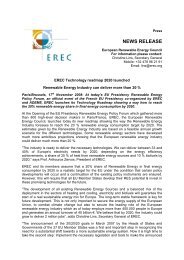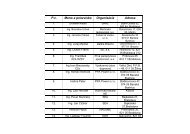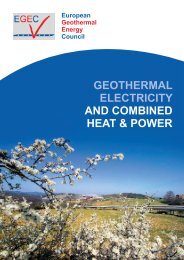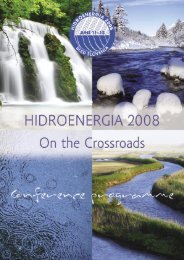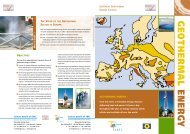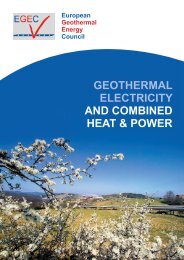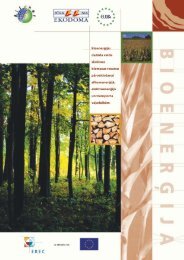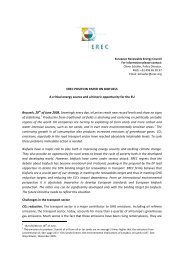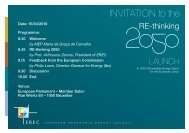English version - European Renewable Energy Council
English version - European Renewable Energy Council
English version - European Renewable Energy Council
You also want an ePaper? Increase the reach of your titles
YUMPU automatically turns print PDFs into web optimized ePapers that Google loves.
C O N F E R E N C E P R O G R A M M EPanel 1a:EXPERIENCES IN THE UTILISATION OF RENEWABLEENERGY SOURCES IN CITIES - HOW FEASIBLE ISIT TO DEVELOP THE POTENTIAL OF RENEWABLE ENERGYGENERATION IN AN URBAN ENVIRONMENT?Nearly 80% of the <strong>European</strong> population live, work anduse leisure facilities in cities, almost the half in citieswith more than 50.000 inhabitants. Nearly 70% of theenergy consumption occurs in cities. The developmentof sustainable energy strategies in urban areas is clearlya priority. It is not only the large numbers of energyconsumers which is at stake, but also the quality of theurban environment which is of fundamental concern,and for which the implications go far beyond the localcommunity. Apart from environmental considerations, alocal sustainable energy policy can have major impactson employment, social cohesion, participation of civilsociety, and economic development, as well as on urbangovernance. Examples have shown that proactive RESpolicies in cities can substantially increase the share ofRES, thereby improving living conditions and contributingto reaching the objectives outlined by the UnitedNations in their AGENDA 21 initiative.More recently, there have been clear signs of a politicalcommitment towards more integrated policies and conceptsaiming to convey sustainable energy strategies intocity policies. Such commitments aim at demonstratingthe benefits of a high degree of decentralised energysupply through recourse to new and renewable energysources, in combination with a conscious application ofleading energy efficiency measures in the various endusesectors. Recent <strong>European</strong> legislation in the energyfield, such as the Directive on the <strong>Energy</strong> Performance ofBuildings, pushes forward this integrated approach, andshould open the opportunity for more efficient consumptionthrough ambitious urban rehabilitation.How does the use of <strong>Renewable</strong> <strong>Energy</strong> Sourcesin cities lead to better standards of living anda reduced environmental impact?How relevant are policy frameworks to increased<strong>Renewable</strong> <strong>Energy</strong> penetration in urban areas?How to tackle the challenge of integratedconcepts “high energy-efficiency / decentralisedRES” in urban energy planning?Several large urban areas across Europe have demonstratedan outstanding level of excellence with regard tothe integration of sustainable energy concepts, includingrenewable energies. In the North or in the South ofEurope, numerous examples illustrate how far awarenessof and commitment to renewable energy solutionscan make cities improve in their energy planning andresource management. Politicians, planners, developersand citizens are all key stakeholders in this process, andcan help to achieve a genuine change in the urban energyscene. This session will present examples of successfulrealisations of sustainable strategies, discuss barriersand challenges, assess the impact of policy frameworksand come up with future needs for public interventionon the level of municipal authorities, MemberStates frameworks and <strong>European</strong> intervention.Cities2500200015001000The Aalborg Charter, the Charter of <strong>European</strong>Cities and Towns towards Sustainability is a uniquepolicy statement for local sustainable developmentworld-wide. Born in 1994 and initially signed by 80local authorities, it counts today more than 2000signatories - metropolitan areas, cities, towns andcounties. The Charter itself provides for a policyframework initiating processes to the creation ofsustainable development plans at local level, initiatedthe <strong>European</strong> Sustainable Cities & TownsCampaign to support cities on their path towardssustainability and calls upon the local authorities toengage in the Local Agenda 21 Processes.Signatories of the Aalborg Charter 1994 - 2003500080174305383446What recommendations and hints for successcan be derived from existing initiatives?What sort of Community intervention andpromotion would be appropriate for the next5 years in the form of a future “<strong>European</strong>Public Awareness Campaign?”62788014061859What should be the role of the privatesector in this context during next 5 years?20301994 1995 1996 1997 1998 1999 2000 2001 2002 2003Source : <strong>European</strong> Sustainable Cities & Towns CampaignR E S I N C I T I E S - P A N E L 1 a9



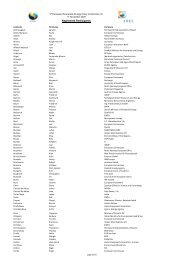
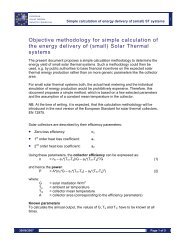
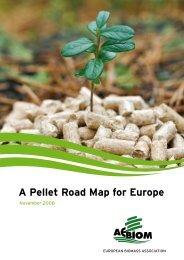
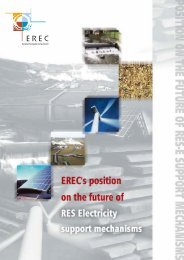
![Energy [R]evolution - Greenpeace](https://img.yumpu.com/47174859/1/184x260/energy-revolution-greenpeace.jpg?quality=85)
